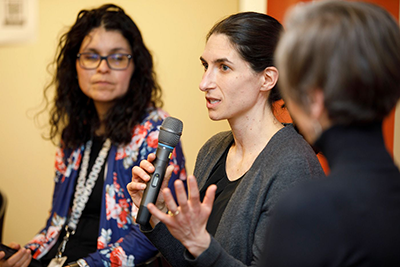Education
Students across the Division of Biology and Medicine at Brown are learning how disruptions to Earth's natural systems impact human health.
Education
Students across the Division of Biology and Medicine at Brown are learning how disruptions to Earth's natural systems impact human health.
Learning Opportunities in Planetary Health
Brown offers in-depth learning opportunities in planetary health at all levels of education.
 Planetary Health courses are available to undergraduates at Brown and as a theme option in the Health & Human Biology Concentration.
Planetary Health courses are available to undergraduates at Brown and as a theme option in the Health & Human Biology Concentration.
- BIOL1255- Climate Change & Health: Infections & Inequalities
- BIOL1455 - Planetary Health: Global Environmental Change and Emerging Infectious Disease
Ecology forms a critical part of the expertise required to understand and address the current crisis of rapid environmental change. To that end, many courses offered by the Department of Ecology, Evolution and Organismal Biology (EEOB) provide important insight into planetary health and complement courses that focus on environmental policy issues.
EEOB Faculty, along with those in the Institute at Brown for Environment and Society (IBES) and the Department of Earth, Environment and Planetary Sciences (DEEPS), are the major contributors to instruction in environmental science and the Environmental Science concentration at Brown.
 In 2022 The Warren Alpert Medical School Curriculum Committee approved the longitudinal integration of Planetary Health into the curriculum. The mission of the Warren Alpert Medical School Planetary Health Curricular Integration Committee is to promote, develop and implement Planetary Health content throughout the medical school curriculum, empowering students and faculty to act on issues pertaining to Planetary Health. The Committee is working with students and instructors now to develop, integrate & assess content.
In 2022 The Warren Alpert Medical School Curriculum Committee approved the longitudinal integration of Planetary Health into the curriculum. The mission of the Warren Alpert Medical School Planetary Health Curricular Integration Committee is to promote, develop and implement Planetary Health content throughout the medical school curriculum, empowering students and faculty to act on issues pertaining to Planetary Health. The Committee is working with students and instructors now to develop, integrate & assess content.
Planetary health education at the Medical School will prepare students to:
- Describe through examples and case studies how anthropogenic changes to natural systems influence health outcomes
- Articulate the disproportionate impact of environmental changes on marginalized and vulnerable populations
- Incorporate knowledge of environmental change into clinical practice to inform exposure histories, diagnosis, treatment and prevention
- Propose strategies to engage marginalized and vulnerable populations in making decisions that affect the health and well-being of populations and ecosystems.
- Effectively communicate messages on planetary health using appropriate techniques and modalities scientific findings to the patients, lay audiences, media, clinicians, scientists and policymakers.
- Propose strategies that achieve “patient-planet health co-benefits”.
Scholarly Concentration in Planetary Health
Scholarly Concentrations is an elective program through which Warren Alpert medical students undertake rigorous independent scholarship in a cross-disciplinary field of interest related to medicine, public health, engineering, or a biomedically relevant topic in the sciences, arts, or humanities.
The scholarly concentration in planetary health allows students with deeper interest in the field to go beyond these overarching objectives and pursue interdisciplinary inquiry-based learning in the field. Graduates of the planetary health concentration will be positioned for leadership roles at the health-environment intersection as they move through residency and beyond.
Read more about the scholarly concentration in Planetary Health.
The Pathobiology Graduate Program offers graduate students in the Division the opportunity to delve into the connection between environmental and human health. Faculty in the Department of Pathology and Laboratory Medicine as well as researchers at the Legoretta Cancer Center are leading contributors to the Program. Their work is integrative and cross-disciplinary, spanning cancer biology, environmental pathology, and infection and immunity.